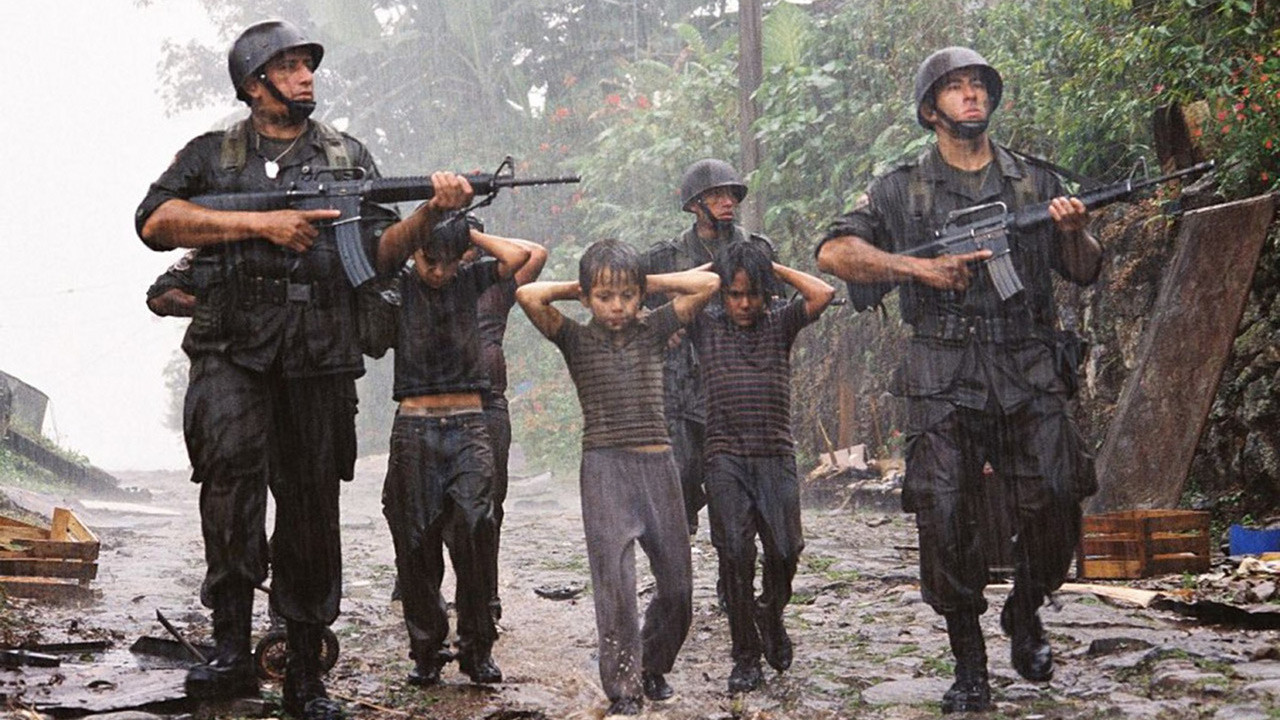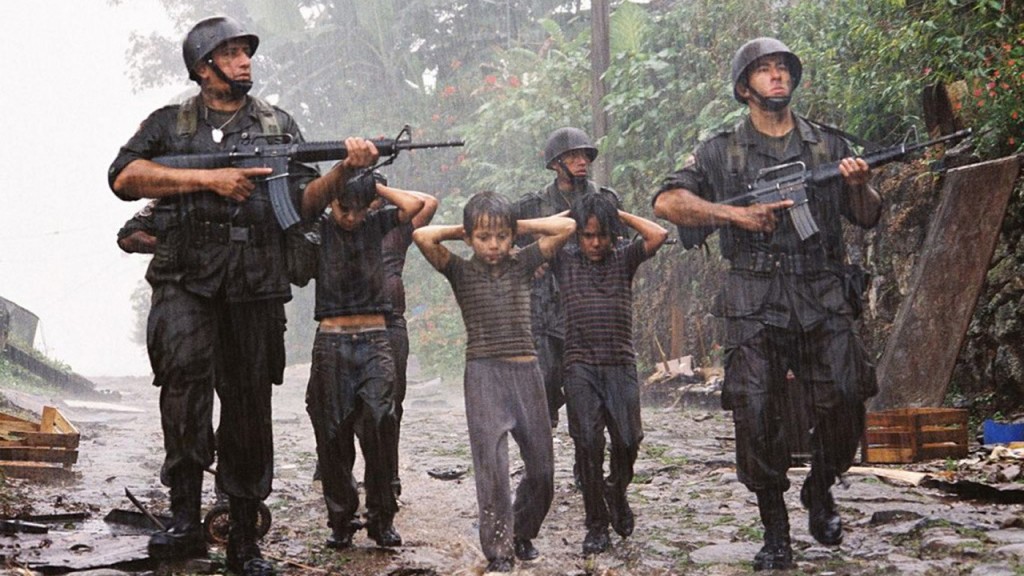Buried underground but present in the collective memory, the secrets of the brutal Guatemalan Civil War remained unspoken until a group of brave men and woman, many of whom were also searching for or mourning a loved one, took it upon themselves to begin the grueling quest for truth. Inspired by the trial that resulted from the testimony of a survivor, director Ryan Suffern set out to reconstruct the story of the Dos Erres massacre, (one of the most notorious operations during the conflict), by contrasting the accounts of those directly affected in the mystery-like narrative of his film Finding Oscar.
On December 6, 1982, following an incident in which the guerrillas had killed 21 soldiers, the US-backed government of Efraín Ríos Montt sent a special forces unit, known as the Kaibiles, to murder the entire population of the Dos Erres village, claiming they were guerrilla supporters. The viciousness with which children and women met their death set this incident apart in a horrifying manner. Unexpectedly, two young boys, likely because of their lighter skin and colored eyes, were taken by two of the perpetrators and adopted as their own. One of them, Oscar Ramirez, would become the key piece to bring visibility to the case and, at the very least, partial justice.
Suffern imbues the documentary with tension by visiting pivotal locations in Dos Erres, such as the well where most of the bodies were found, and scoring these images with interviews with two of the Kaibales who witnessed and participated in the massacre. Among these are Aura Elena Farfán, who founded FAMDEGUA, an organization dedicated to finding the remains of the deceased in order to keep their memory alive; prosecutor Sara Romero, who pursued the case relentlessly for years, and even the boys, now men, themselves. An added badge of honor for the film is that Steven Spielberg got on board as Executive Producer.
Although the events observed in Finding Oscar are undeniably unspeakable, they were not the exception but the norm across Central America during the 80s and 90s, as El Salvador, Nicaragua, and, of course, Guatemala, endured devastating civil wars often worsened by the United States’ intervention. To provide a wider perspective of these conflicts, we created a list of films by country that can serve as cinematic timeline of the events. You might notice that most of the movies were made by filmmakers from other countries, which reflects the fact that these recent wars hindered the development of a significant film industry in the region, until very recently with Central American films now a regular part of film festival programs.
Finding Oscar opens in New York theaters on April 14 and in Los Angeles on April 21, followed by additional cities.
??
Voces Inocentes
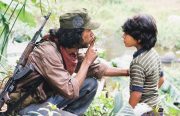
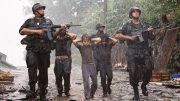
Based on a true story, this moving film follows a young boy who must choose between enlisting in the Salvadoran army and joining a band of guerrillas. Set during the civil war of the 80s, it’s a peek into the lasting legacy that U.S. intervention has had in Central America.
El cuarto de los huesos


From the Institute of Legal Medicine, El cuarto de los huesos (The Room of Bones) follows several mothers from El Salvador who search for the remains of their children, who disappeared amidst violence in their country. The film is a look at the 20 or more bodies that are received at the morgue on a monthly basis and remain unclaimed – the story of DNA with no name, of bodies that became cadavers for belonging to a rival gang.
Uno: la historia de un gol
In the early 1980s, as El Salvador was in the midst of its brutal civil war, a group of Salvadoran futbol players emerged to unite their entire nation with their game. Achieving an unforgettable qualification to the 1982 World Cup in Spain, they would try to score El Salvador’s first World Cup victory. With a homeland ripped apart by guns and guerrillas, their team’s selection provided hope for all Salvadorans. This insightful and honest film recounts a David-and-Goliath story of great hope and terrible disappointment.
El Salvador: Another Vietnam
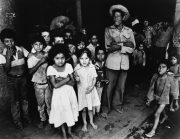
Nominated for the Academy Award for Best Documentary Feature, this concise work compares the US involvement in El Salvador to the actions that led to the Vietnam War. By lending American military advisors to the dictatorship in power in order to persecute those labeled as communist, unspeakable crimes were justified. The film also touches on other factors that influenced El Salvador’s troubled history during most of the 20th century.
El lugar más pequeño



Highlighting the resilience of the human spirit, El Salvador-born filmmaker, Tatiana Huezo, explores the aftermath of the devastating civil war in the Central American country through the experiences of five families that returned to their village, Cinquera, over a decade after its destruction. Huezo’s documentary chronicles their journey and traces a harrowing history they’re only now able to articulate. Their testimonies are simultaneously heartbreaking and uplifting. Despite the tragedy, the survivors choose to rebuild and move forward, while never forgetting those who died in the conflict. Memory is their most powerful weapon for a peaceful future and El lugar más pequeño is proof positive of the way storytelling can be both a way to look back and to move forward.
Romero

At a time when human rights violations were rampant in El Salvador, Archbishop Oscar Arnulfo Romero was advised by the Vatican not to get involved in the country’s political situation. However, because of his close friendship with Father Grande, a man who believed in social justice, Romero slowly begins to leave his conservative stance and speaks out against the violence and oppression that had become commonplace. Hostility towards Romero and other priests escalates as the government attempts to silence him. Fearless, Romero doesn’t back down and fights until his last breathe.
??
Finding Oscar


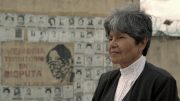
In 1982, an elite Guatemalan government squad massacred over 200 residents of the rural village of Dos Erres. The number merely added to the hundreds of thousands who lost their lives, or were disappeared during the country’s 36-year-long civil war. As it turns out, two young boys survived the massacre. More improbably, their story and survival was the only key to finding out precisely what happened back in 1982. Produced by Steven Spielberg and Frank Marshall, Finding Oscar traces the story of finding one of the boys and the quest for justice that followed.
https://www.youtube.com/watch?v=ynP2e1-Gl7s
Granito

Focusing on how the armed conflict that unfolded in Guatemala in the 1980s affected the country’s indigenous population, this documentary aims to revisit the memories of the genocide perpetrated under the “scorched earth” military campaigns in order to seek justice. Five central characters provide diverse perspectives into the events that resulted in the deaths of 200,000 Maya people, including 45,000 disappeared, and that indelibly marked their homeland’s past, present, and future.
When the Mountains Tremble

Centered on indigenous leader and Nobel Peace Laureate, Rigoberta Menchú, one of the most iconic and influential figures in recent Latin American history, the filmmaking duo use an amalgamation of distinct visual materials to chronicle the struggles of Guatemala’s indigenous population against their own government’s oppressive policies. Menchú emerged as a voice for social revolution during wartime, which makes her contributions to her people’s fight all the more remarkable, as the engaging doc depicts.
Guatemala: The Secret Files
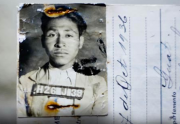
This segment from PBS’ renowned series Frontline World takes reporter Clark Boyd to Guatemala, where he meets key figures in the revitalized investigation and historical analysis of the mass killings that took place during the country’s bloody civil war. Guatemalan activists join forces with American organizations that provide the technology required to safeguard the memories of the deceased and disappeared.
??
Alsino y el cóndor

Chilean director Miguel Littín tackles civil war in Nicaragua through the eyes of a young boy, Alsino, whose village is transformed into a staging area by American troops forcefully throwing him into the conflict. His innocence is shattered and his playful dreams forgotten. Eventually, Alsino’s interactions with the army awaken in him sympathies towards the rebel groups. The film earned Nicaragua, and Central America in general, its only Oscar-nomination to date in the Best Foreign Language Film category.
Princesas rojas



Forced to leave their lives in Nicaragua and resettled in Costa Rica, two young girls, Claudia and Antonia, must adapt to their new environment in a country mostly unaffected by the turmoil in the region during the 1980s. As the daughters of two Sandinista activists on the run, the sisters experience abandonment, betrayal, and a double life driven by secrecy. Meanwhile, their parents are confronted with their loyalty to the movement they once believed in and their uncertain future.
Carla’s Song

Scottish bus driver, George Lennox, meets a young Nicaraguan woman, Carla, who left her home country for Glasgow to escape the war. A romance rapidly develops between the two. Uncertain about her loved ones’ whereabouts and deeply depressed, Carla decides to return to Nicaragua, alongside George, in spite of the precarious situation as the Contra insurgency fights the Sandinistas. While searching for her family and the boyfriend she left behind, Carla and George are faced with unexpected circumstances that will test their relationship.ca
Palabras mágicas (para romper un encantamiento)


Profoundly personal and visually evocative, this blend between the filmmaker’s memories and the Sandinistas failed promises for a brighter future in her native Nicaragua is a unique cinematic poem – at once historically insightful and fully idiosyncratic. Period footage and images of Lake Managua, which it’s used as a symbol of the country’s decay, are juxtaposed in this powerful vision.
Latino
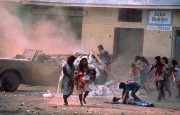
Mexican-American Vietnam veteran, Eddie Guerrero, travels to Nicaragua to help train US-backed Contra rebels as they battle the Sandinista government. At the same time, local farmers are affected the Contra’s attacks, which are planned near the country’s border with Honduras. Eddie falls for a local woman, Marlena, who works to unite the farmers. With the war intensifying, Eddie’s involvement with the Contra insurgency clashes with his personal desires in irreparable ways. The film premiered in the Un Certain Regard section at the Cannes Film Festival.
Ballad of the Little Soldier

German auteur Werner Herzog captures the heartbreaking stories of young children turned soldiers in 1980s Nicaragua. In order to defeat the Sandinistas, a group of the Miskito indigenous people used child soldiers in their fight.



